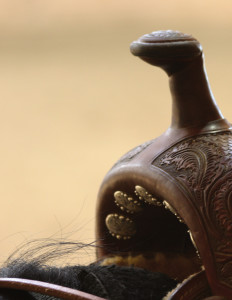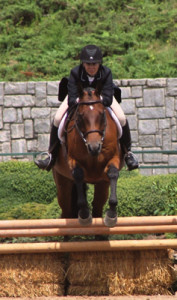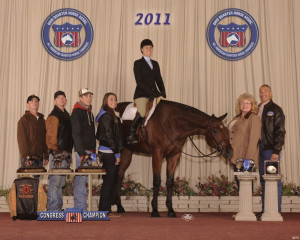Back in the Saddle
Click here to read the complete article
Return to Riding After a Serious Injury
by Kristen Spinning
 Thwack! The sudden darkness makes your head spin. Time slows in the initial state of shock, allowing a surreal mix of thoughts to run simultaneously, all underlined by the steady and sinking knowledge that you’re hurt, and it’s serious….
Thwack! The sudden darkness makes your head spin. Time slows in the initial state of shock, allowing a surreal mix of thoughts to run simultaneously, all underlined by the steady and sinking knowledge that you’re hurt, and it’s serious….
There is no question about it: horses are an integral part of our lives. Whether it’s hanging around the barn with friends, practicing patterns, unwinding with a leisurely ride, or competing, horses are intertwined with our very being. Our calendars are scheduled around the needs of our horses. Riding horses may even be part of how you define yourself as a person. So what happens when this horse-centric life is suddenly derailed by an injury?
Recovery from injury has two components: physical and emotional. The physical repercussions are usually obvious and often come with a well-established plan for recovery and rehabilitation. The emotional and psychological components are much harder to understand. You suddenly realize you aren’t invincible. Your life, routine, and social interactions become jumbled. You suffer not only the loss of health, but an injury can also lead to the loss of self-esteem.
The emotional upheaval that comes with a serious injury spawns a number of reactive behaviors that are often overlooked when a rider has a bad wreck. There is a range of literature on sports psychology that can apply to the equestrian athlete. From scholarly articles to self-help tomes, several generally agreed upon themes emerge:
Isolation
There can be a feeling of social disconnect when you’re cut off from the activities at your barn. You may suddenly feel distant from friends and colleagues as they continue riding and showing, while you’re forced to sit at home and rest.
Fear/Anxiety
Many injured athletes experience anxiety over their ability to heal well enough to return to their previous level of competition. It’s hard to completely put aside the fear of another injury and another cycle of pain, rehab, rest and recovery. Several studies have demonstrated that the fear of re-injury can actually lead to certain behaviors that prolong the recovery period.
Depression
It should be of no surprise that you would feel sad when deprived of riding, interacting with your riding buddies, and perhaps even being unable to visit your horse. It can be devastating when an injury is severe enough that your ability to ride again is in question. When depressive symptoms persist or become severe, they can require professional medical help.
Loss of Identity and Self-Esteem
If showing horses is how you identify yourself, and now you can’t show, who are you? What will replace the constant supply of positive self-esteem? There is immense joy in mastering that smooth transition or maneuvering cleanly through a tricky Trail obstacle. Without it, a vast hole can remain.
Stress
There is a soothing, de-stressing tonic that horses provide as the antidote to our hectic lives. Actively engaging in any sport or physical activity provides stress relief for many people. When lost, that stress can build. The added burden of managing pain, doctor visits, and life disruption only escalates stress.
Research has revealed a direct connection between increased stress and increased injury rates. The theory is that stress impacts mental focus and muscle tension, thus leading to greater numbers of injury producing incidents. Therefore, stress can factor into a cycle with fear of re-injury and actual re-injury.
The Road to Recovery
Sports medicine professionals have found that several things can help get any athlete back into the game:
Goals
Setting goals that have specific dates can be especially beneficial by creating motivation and measuring progress. Continually re-affirm that goal: “I’ll enter four classes in the November show.” Goals should be specific, achievable, measurable, and inspiring. Having short-term goals can help regain self-esteem as well as keep recovery on track as one progresses toward the big goal.
Positive Attitude
It’s so easy to listen to those negative thoughts. Psychologists suggest replacing negativity with practiced, positive self-talk. “I’m on track with recovery. My stamina is better today.” A constant finding of research is that people with a positive view of their recovery do much better.
Relaxation
Practicing relaxation techniques can be useful in relieving physical pain as well as the emotional stress and anxiety that comes as the result of an injury. Deep, measured diaphragmatic breathing is often recommended; It’s easy to learn and can be done anywhere. Some other techniques include music, mindfulness, guided imagery sessions, and meditation. Riders have an additional technique in their bag of relaxation tricks: horses. Most equestrians cite how their horses help reduce their stress.
Education
Improve your knowledge of the injury and how your body heals. Learn what to expect in terms of time, physical therapy, and the possibility of setbacks. You will make better decisions and have the feeling that you’re back in control. Be wary of Internet advice, as it is often not reliable—and sometimes downright scary.
Visualization
In any endeavor, envisioning success helps one achieve success. Using positive, vivid mental imagery has been documented to boost performance. You can visualize yourself in the show ring. Imagine every move and how much you enjoy being back in the saddle.
Your barn and show buddies who cheer you on from the rail can support and encourage you throughout this process, yet they might not know how they can help. Just ask! You aren’t burdening them; you’re helping them in their desire to help you. There is also a wealth of information in your network. Most likely, someone knows someone who has had a similar injury. Talking to that person can help immensely.
Many familiar faces on the show circuit have been sidelined by injury, and they have their own unique ways of getting back in the saddle.
Texas-based horse trainer Beth Case had a 2-year-old lose balance and fall on her a couple years ago. That wreck resulted in a broken foot. She recalls, “At first, I couldn’t put any weight on it, but I thought, I’m not crying, so it can’t be broken!” She continued with her routine, though it still hurt considerably. Finally, she got an X-ray, which revealed she needed to wear a walking cast and was advised not to ride. “The Quarter Horse Congress was two weeks away, so I couldn’t just stop. I only rode the ones I needed to show. Some people asked, ‘You’re not going to ride that horse again… are you?’” Knowing Beth, they really didn’t need to ask. Her overwhelming positive attitude certainly aided in her recovery.
At the Congress, she rode with only one stirrup, still not able to put weight on the broken foot, let alone get her heels down. She jokes that she looked like a pirate the entire time, as if she was stumping around on a wooden leg. Despite the encumbrance, she piloted that same horse, It’s Been Awhile, to a win in 2-year-old Hunter Under Saddle. As for any anxiety, Beth brushed it aside, saying, “My only fear was riding in traffic at the Congress and getting my foot bumped.”
Becky Meadows had a recent accident that confirms it doesn’t have to be a big, dramatic event that sends you to the hospital. It happened when she was riding a colt at home. “We were turning left and he leaned right. He didn’t do anything bad or kick out. He just got his feet tangled up.” She doesn’t remember much after that. Becky was knocked unconscious, and even when she awoke, she was very confused. She was flown to The University of Virginia Medical Center in Charlottesville for scanning and evaluation. Fortunately, the doctors determined rather quickly that she would recover with plenty of rest. “I couldn’t ride for six weeks or drive for a couple weeks. It’s hard, because you want life to get back to normal as quickly as possible.” Becky was fortunate to have a solid support structure within her family. They did their best to keep her involved, although she admits to having a feeling of disconnect while missing the show scene. “Soon after the accident, there was a show that our association puts on. I’ve always been a part of it. It was a little unusual seeing it from the outside looking in. I was so tired, I couldn’t even last as a spectator,” she says.
Becky was rather surprised by the physical effects of her injury. “I went from riding several horses a day to being at ground zero and having no stamina,” she laughs. “You’re finding places to take a nap that you never thought of before!”
When she was finally cleared to ride again, she started slow. “I started with the old, safe ones, the ‘been-there, done-that’ types. It surprised me that I had a fear of not being able to react fast enough. I found myself thinking, if something happens, can I take care of myself?” Nowadays, she finds herself more thoughtful of her surroundings and riding conditions in the wake of the accident. “That sort of thing can go so many ways. I feel blessed and fortunate that it turned out all right.”
“You have to put it out of your mind,” insists Marilyn Masterson when she speaks about mounting up again after an injury. She advises, “You tell yourself that it was that horse and that situation. Freak accidents can happen,” She remembers warming up for a class at a show a few years back, when the evening’s band suddenly started up. The loud noise startled her horse, and he ran headfirst into the arena gate. Marilyn broke three ribs. She was told not to ride for six weeks.
“I didn’t lose much riding time,” she admits with a smile in her voice. “I think I was back riding after about three weeks. Horses are therapy to me, so I had to be out there. I wanted to get back to where I was before the accident as quickly as possible.”
Surrounded by the horses and activities of Masterson Farms, Marilyn had great support and never experienced the disconnection of being sidelined. Like many injured riders, her positive attitude and goals of being back in the ring a soon as possible were key to rapid healing.
Marilyn had a second incident with that same mare soon following her return to showing. She felt it was wise to start again with a new horse. “It takes time to re-bond,” she says. “You have to build trust all over again, like with any new horse.” Despite her practiced purging of past negative experiences, she acknowledges that doubt and alarm can creep back into your psyche. Little things can happen when riding that cause her to think about that wreck. “If my horse raises her head more than usual, it brings it back. There’s that feeling, and I tense a little. But it comes down to you having to trust your horse and trust your trainer that they know what they’re doing,” she says.
 Despite a backbreaking fall in January of 2014, Terrie Booth is back in the saddle and back on the circuit. She credits a positive attitude, wonderful support network, and the healing power of equus amores for her successful recovery. Terrie had recently started showing a new horse and was competing at a show for the first time in Venice, Florida. The normally calm gelding sailed through the over fences part of Hunter Hack, though Terrie could tell the afternoon breeze was freshening him up. When the rail work started, he bucked, and she came off. An unstable fracture in a mid-back vertebra had her on the surgeon’s table a few days later. “If I had any advice for someone getting hurt at a show, it would be to take that ride in the ambulance,” she jokes. She opted to get changed and be driven to the hospital by her trainer. She certainly wasn’t laughing after two hours waiting in the ER though. One of her first questions to the surgeon was, “Will I be able to ride again?” The doctor wisely counseled that she would, but that she would need to lay off for six months and be cautious when returning. She adds, “He said I had to do what I wanted to be happy in life.” Happiness fosters recovery.
Despite a backbreaking fall in January of 2014, Terrie Booth is back in the saddle and back on the circuit. She credits a positive attitude, wonderful support network, and the healing power of equus amores for her successful recovery. Terrie had recently started showing a new horse and was competing at a show for the first time in Venice, Florida. The normally calm gelding sailed through the over fences part of Hunter Hack, though Terrie could tell the afternoon breeze was freshening him up. When the rail work started, he bucked, and she came off. An unstable fracture in a mid-back vertebra had her on the surgeon’s table a few days later. “If I had any advice for someone getting hurt at a show, it would be to take that ride in the ambulance,” she jokes. She opted to get changed and be driven to the hospital by her trainer. She certainly wasn’t laughing after two hours waiting in the ER though. One of her first questions to the surgeon was, “Will I be able to ride again?” The doctor wisely counseled that she would, but that she would need to lay off for six months and be cautious when returning. She adds, “He said I had to do what I wanted to be happy in life.” Happiness fosters recovery.
She was surprised at how physically debilitating the injury was for her. “I thought I was in good shape before the accident, but everything kind of went to pieces.” To rebuild, she walked a lot, rode a bike, worked on her core strength, and had to get her legs back in shape. Her goal was to show at the Congress later that year. She recalled with a self-deprecating lilt, “I went, but it wasn’t great. Very soon it became apparent that I didn’t have my strength back yet.”
Terrie was fortunate that she didn’t experience any social disconnection. She maintained her involvement at the barn by finding new ways to interact. She found herself helping others a lot. “I would go and put tails in for people, braid manes and such.” She agrees that horses are very stress-relieving, which in turn helps with recovery, “Our barn is like a family. Everyone was so supportive. I wasn’t isolated at all. I think that’s what kept my mind going through it all.” Her horse was still showing, and she was able to go to the shows as well.
When the time finally came to get back on, her supporters rallied around her. “I wasn’t really afraid; I knew he was a good-minded horse. A thing like that is never totally out of my mind though,” she says. Her nerves did get a little rattled when showing him in Pleasure Driving a few months later. “A horse hit the wall in my class,” she describes. “All the other horses started running. I was thinking that I might have to bail and was worried about what that would do to my back. Everything was fine though. It’s funny. He bucked me off in January, but he took good care of me in October! I have enough sense now to know I don’t have to do something. If I get nervous enough about a situation, I get off,” she confides.
A serious injury can certainly be disruptive. Yet, as these riders have demonstrated, the same traits help them be successful in the show pen help them to recover from injury and get back in the saddle once again.











